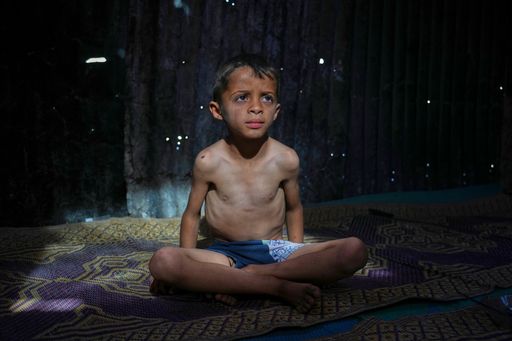The famine in Gaza is a tragedy foretold.
Back in 2021, Israel was one of the only two countries among all UN members that voted against a resolution reaffirming the right to food as a fundamental human right — a motion that passed with 186 votes in favour.
The US was the only country to side with Israel in opposing the access to food as the “fundamental right of everyone to be free from hunger”.
Four years on, that ignominious vote at the UN General Assembly led to Israel’s 11-week aid blockade in Gaza, turning the occupied territory into the “hungriest place on Earth” with all its people facing the risk of famine.
“Palestinians in Gaza have the right to food and security. (The US and Israel) are ignoring international law. The real challenge is that there is no enforceable mechanism against the US or Israel,” Antony Loewenstein, an investigative journalist and the author of the book The Palestine Laboratory: How Israel Exports the Technology of Occupation Around the World, tells TRT World.
Thousands of children face acute starvation in the war-ravaged Gaza as Israel banned for nearly three months all food and medicine from reaching 2.3 million Palestinians facing nonstop bombing for 20 months.
Tel Aviv is now allowing only a small number of aid trucks to enter the territory as Israeli Prime Minister Benjamin Netanyahu fears international allies would withdraw support over “images of hunger”. The volume of aid trickling into Gaza is so small that UN officials have described it as “a drop in the ocean”.
Even though the UN-backed International Criminal Court has issued arrest warrants for Netanyahu and former defence minister Yoav Gallant, no country has shown willingness to actually enforce it.
“We have this real crisis in international law at the moment. But there’s no one to enforce it. There’s no mechanism, no body, no country, no army that is able to enforce international law,” says Loewenstein.
UNICEF recently reported that 71,000 children and more than 17,000 mothers in Gaza needed urgent treatment for acute malnutrition. The UN children’s agency estimates “tens of thousands” of malnutrition cases are expected in the coming year as Gaza teeters on the brink of a famine.
More than 116,000 tonnes of food assistance sufficient for one million people for up to four months is already positioned in aid corridors, but Israel is not letting aid agencies bring it into the occupied territory.
“Israel’s genocide in Gaza is essentially war crime, after war crime, after war crime. There’s no international body or country or force willing to stop it,” says Loewenstein.
Deadly scheme for aid distribution
Israel is using a highly controversial Gaza Humanitarian Foundation (GHF), a US-backed charity, for aid distribution in Gaza in a chaotic and deadly manner.
On Sunday, Palestinian and international officials said at least 31 people were killed and dozens wounded near one of the four food distribution centres operated by the GHF.
A video filmed at GHF’s site showed Palestinians running away from a perimeter fence after GHF contractors, armed with US weaponry, threw a projectile that exploded with a loud bang, a flash and smoke.
Calling for an independent investigation, UN Secretary General Antonio Guterres said he was appalled by reports of Palestinians killed and injured “while seeking aid” in Gaza.
The GHF’s aid plan, which bypasses traditional aid groups, has come under fierce criticism from the UN and humanitarian organisations, which say the US-backed and Israel-endorsed NGO “does not follow humanitarian principles”.
According to WHO emergencies director Michael Ryan, the entire population of Gaza is “in imminent danger of death”. “We need to end the starvation, we need to release all hostages, and we need to resupply and bring the health system back online.”

Starvation as a method of combat
The UN resolution, adopted despite the opposition from the US and Israel, reaffirmed that the “starvation of civilians as a method of combat” is prohibited under international humanitarian law.
“It is therefore prohibited to attack, destroy, remove or render useless… objects indispensable to the survival of the civilian population, such as foodstuffs… crops, livestock, drinking water installations and supplies and irrigation works,” the resolution says.
Israel has severely hampered the ability of the occupied territory’s residents to produce their own food. The UN says 82 percent of croplands in Gaza have been damaged, leaving once-productive fields barren. Nearly 70 percent of agricultural wells have been damaged, while 96 percent of cattle and 99 percent of poultry have died.
The UN resolution also reaffirmed that hunger constituted “an outrage and a violation of human dignity”, requiring urgent measures at the national, regional and international levels for its elimination.
But the US opposed the resolution, arguing it contained “unbalanced, inaccurate, and unwise provisions”. The US did not recognise the right to food as legally enforceable under international law, it said.
“The US is concerned that the concept of ‘food sovereignty’ could justify protectionism or other restrictive import or export policies.”



















